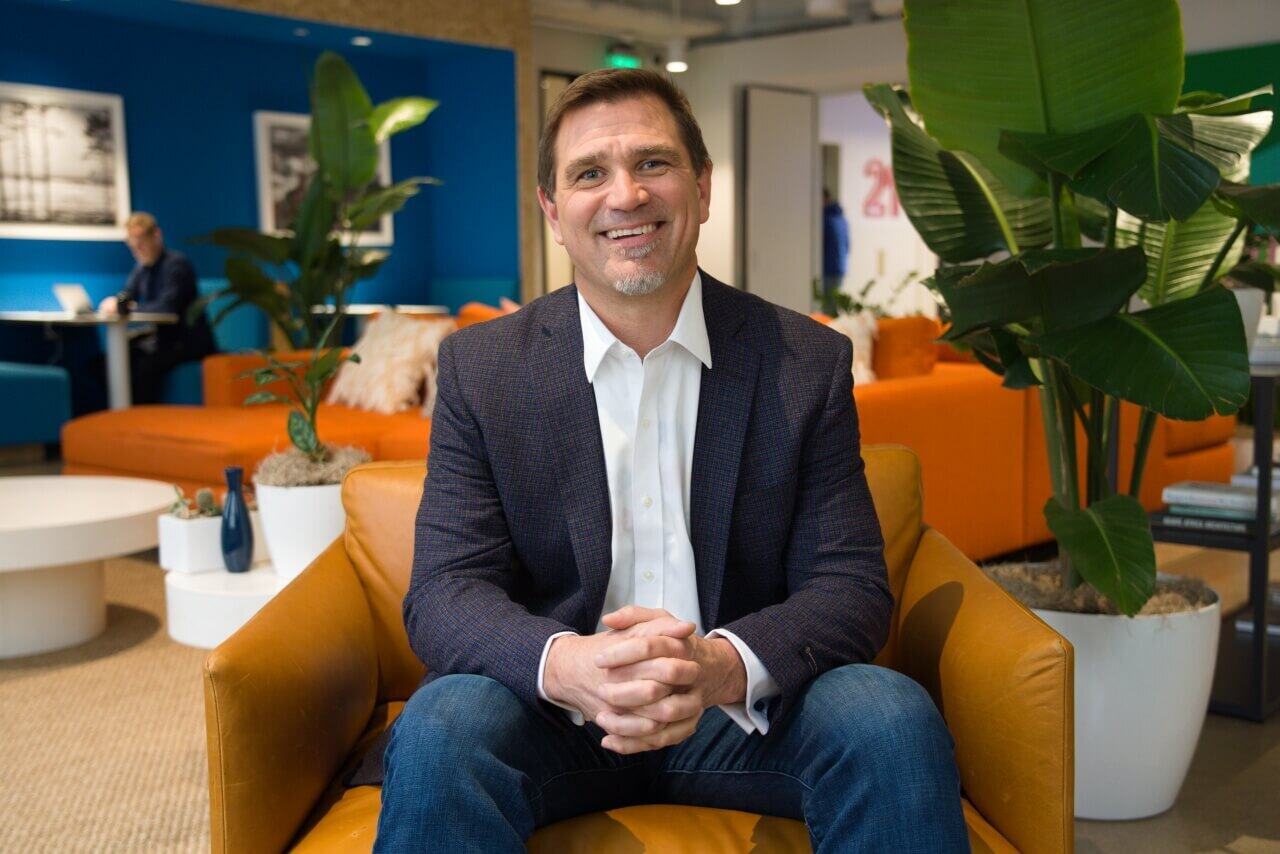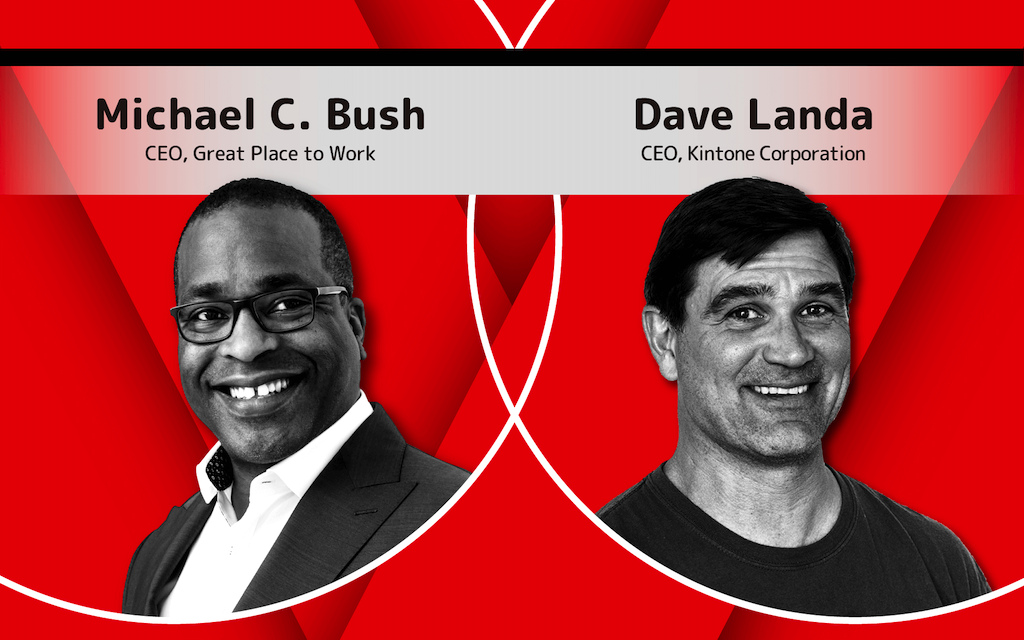In this time of global crisis, work can seem more stressful and overwhelming than ever. Many of us are confronted with a new daily reality, whether it's having to work in isolation, being afraid for our livelihood, or having to work overtime to deal with the consequences of the pandemic.
It is precisely in times like these that we need to remember that light shining from within; the common motivator that unites us in our humanity: our pursuit of happiness.
In his quest to develop a deeper understanding of how to make his employees happier, Kintone Corporation CEO Dave Landa called up a happiness expert: Great Place to Work CEO Michael C. Bush. Together, they talked about the conditions for happiness at work, the merits of a happy workforce, and what we can do to not lose hope in these troubled times.
A recipe for happiness
Dave: Hi Michael, thank you for taking the time! We're very excited to have you with us to talk about happiness.
I know that your company, Great Place to Work, is built around the idea that people should be happy at work. This seems at odds with how most people think about their jobs. Why is happiness at work so important?
Michael: My company has been doing research and analysis on this topic for almost 30 years. Great Place to Work surveys 10 million employees from over 10,000 companies in 98 countries. Our data has shown that companies that create a great experience for their employees financially outperform companies that don't.
There are some exceptions, like monopolies, or companies in communities with high unemployment and turnover. Also, young companies can provide an average experience to their employees and still perform well financially for the first five to seven years. But you're going to have a tough time finding companies who can do so over 20 years.
The data clearly shows that over a long timeframe, great financial performance hinges on how well you treat your people.
Dave: What do you mean when you talk about happiness at work?
Michael: We've noticed that you need three elements to come together in order to make people happy at work.
First is purpose; every person you hire needs to feel connected to the purpose of the organization—share similar values. Second is respect; the leader needs to communicate in a believable way so that every employee feels respected as an individual. Third, and most important, is fairness; people need to be treated fairly regardless of their position within the organization.
On top of that, leaders need to recognize that we're all human, with human emotions. We want to work with people we enjoy. They don't have to be our best friends, but we need to feel like we're working together to accomplish something that couldn't be done alone.
We also want to work with people who care about us, so that we feel a sense of pride that goes beyond the logo on our clothing. When we work with people who care about us, we double-check, we care, we do our best work. Bonuses can't do that. Cash incentives can't do that. Perks can't do that. That's the power of a great place to work.
Dave: Getting a bit philosophical with you here, does that mean you consider happiness to be more a financial question than a moral one?
Michael: I think it's both. However, when I want to talk to a CEO, leading with the financial gets me the meeting. If I lead with culture or morality, I get a meeting with the Chief People Officer, or someone like that.
I'd say about a third of CEOs understand that if I treat my people great, they're going to treat my customers great. Another third is what we call the curious CEOs; who are open to the idea but see it as a risk. And then there's a third who absolutely don't care; who think you should do what you're told or find another place to work.
Our motto at Great Place to Work is: Better for business, better for people, better for the world. Not the other way around. Our book is in the business section. We know from experience that CEOs want to talk to experts in business, not culture.
The best teamwork requires innovation by all
Dave: Earlier you talked about the importance of sharing a common purpose and feeling a sense of pride. At my company, Kintone, that translates to teamwork. What can organizations do to foster more teamwork?
Michael: I'm glad you brought up teamwork, because that's how work gets done. The most effective teams are the ones where people feel like they matter—like their input is essential to the team doing great work.
Less effective teams have one or two people who wish everyone else were as smart as them. Instead of achieving an optimal solution, they'll get to a sub-optimal solution, but faster. What less effective teams won't do is innovate. Groundbreaking innovation comes from all.
As companies who do team analysis know, the two most important questions leaders should ask their team members every week are:
(1) What was your worst moment of the last week?
(2) What was your greatest moment of the last week?
Then, leaders need a high level of trust in the team. People need to be able to say what's on their mind without being afraid others will judge them or say they're not as smart. When you're brainstorming new ideas, you want everyone to pitch in. We know from research that the companies with the best teamwork are the ones that achieve this principle of innovation by all.
Dave: There seems to be a disconnect between the idea of innovation by all and how we talk about innovators in society. We always talk about the individual, not the team. As a culture, are we looking at things the wrong way?
Michael: Even the most talented innovators, the ones we put on a pedestal, didn't do things themselves. Even Einstein got help. Our research shows that the greatest innovation comes from groups of people.
This is very important for leaders, who shouldn't prop up individuals, but instead consider that anyone who has a smartphone—which is everyone—is a potential innovator. Everyone should be looked upon for ideas. Everyone should be testing and experimenting. Everyone should be vetting hypotheses.
This goes back to two of the important conditions for happiness: respect and fairness. People working for organizations where they feel respected and treated fairly will be more agile and adaptive. They will also trust their leaders more. They'll be down with trying bold, new ideas.
If you have hero-like figures in your organization, when they come up with new ideas, everyone else will wonder, "What's in it for me?" A majority of people will feel like they aren't part of the innovation, so they won't engage.
Just look at the Marvel movies. The heroes in there are pretty lonely. They're not leading very happy lives.
What do you show by being transparent?
Dave: I want to go further into the elements that make teamwork possible. At Kintone, our mission is to build a society brimming with teamwork. We've identified four necessary components to make that possible. We've already talked about the first one, which is sharing a common vision. You mentioned the second one, which is respect for individuality. The third is to be yourself and take responsibility. The last one is to be transparent.
I want to ask you specifically about transparency. We hear a lot these days about radical transparency. In your research, have you observed a direct link between transparency and happiness? Does more transparency bring more happiness?
Michael: At my company, we believe in transparency. We prefer to use the term credibility, and we score it in our surveys. Nine of the 60 questions on the survey are about credibility.
When it comes to radical transparency—or what thought leaders nowadays like to call radical candor—that sounds crazy to me. The people who say that giving feedback in a brutal and direct way is the best way to do it, those same people are rarely on the receiving end. They're in the power seat so they love it, but it doesn't inspire anyone else.
In the real world, what matters is that you tell people the truth, so they understand why you do what you do, and you tell it in a way that is connected to the purpose of your organization. If I'm transparent in telling people everything I do is about cash flow, that's not going to inspire anybody. Transparency without purpose isn't worth much.
If transparency is tied to the purpose, if you tell me I'm not doing a good job, I know it's because you think what I'm doing isn't helping us achieve our common mission. Then it's not personal. Then I can hear that feedback.
Also, transparency only impacts overall happiness when exercised fairly. Let's say I'm a receptionist, and my leader comes in and tells me, "Let me tell you how important your job is. When people walk through that front door, you begin to shape our brand. You show them who we are on the inside. You get them interested in who we are and what we do. We can't achieve our purpose unless you do a great job at the front desk."
Now I feel linked to the purpose of the organization, I feel respected, and I feel like I'm being treated fairly. The three elements of happiness. If I see you talk to other people about their purpose, but you never tell me why I matter as a receptionist, then you may be transparent, but it won't make me happy.
The future will be about employee experience
Dave: What are organizations around the world doing to make employees happier? What trends are you seeing?
Michael: More and more companies are trying to be aware of the experience their employees are having, and to improve that experience. Some people call that happiness, some say engagement, but those are two sides of the same coin.
Greater awareness of employee experience is how you attract and retain top talent. Even in a recession—like the one we're heading for—you want to keep top talent.
Our data shows that—although this may change with the upcoming recession—until now employee experience has been a deciding factor for millennials choosing where they want to work. Engineers aren't coming out of school any more saying, "I want to work for Google because it's Google." It's becoming less about the brand and more about the experience.
So the biggest trend we're seeing in about 70% of companies is that they are trying to improve employee experience. We still have 30% that don't care.
Dave: Do you think any specific policies are important to improve employee experience? Are policies as important as the three elements of purpose, respect and fairness?
Michael: We have studied this extensively, I can say unequivocally that if you have a choice between all the best perks in the world on the one hand, and a leader who treats you with respect on the other, the leader will win every time. Every time. It's not even close.
Everybody always talks about the perks, but if you want to create an environment where your people are happy, you work with the leaders.
We have tons of examples of this. We work closely with a lot of companies in Silicon Valley, and we see time and time again these people who would rather do a full day's work for less money than work 10 a.m. to 2 p.m. for more pay but doing a meaningless job.
That being said, you should still have benefit programs that are consistent with the values and purpose of your organization. For example, if you believe in fairness, that should show up in your family leave policy.
Dave: A lot of companies advertise their perks, but not many talk about their leaders. How can people know what leadership will be like before joining a company?
Michael: With the impending recession this shift might slow down, but as of right now, we are moving toward an age where people choose their leader. I know of at least four startups working on platforms for employees to post information about their leaders.
Millennials in particular want to know they're going to work for somebody who gets it; who will give challenging assignments, provide feedback, listen to them, develop them and so on. The younger generations are adept at using social platforms to go out and ask, "I'm going to work for Mary Gibson; can anybody tell me about Mary?"
Companies that understand this will let you know about Mary during the recruitment process. They're able to say, "You'll be working for Mary Gibson. Nine out of 10 employees that work for her want to stay in their jobs for a long time. Here's why." That's the direction companies will be heading.
In times of crisis, remember our common humanity
Dave: To finish up, I want to talk about COVID-19. In this new environment, many more people are working from home. Do you have any insight or ideas on how to maintain engagement and happiness for employees working remotely?
Michael: We know from our surveys that whether working from home or doing vital work in sectors like health care and distribution, the number one thing on employees' minds during crises like this one is physical and mental health. Number two is child care and elder care. Number three is family, neighbors and society. Number four is money.
Money is last on that list because it's last; even though we talk about it the most. We talk about money because it's the easiest to talk about, and it can help solve some of the problems we face. What people talk most about isn't what people worry most about. Leaders need to realize that.
Leaders need to communicate with their people at least once a week via video. It doesn't have to be super curated, but it has to be credible. Employees don't care about their CEO's toilet paper needs. What they really want to hear is things like, "I'm worried. My mother lives in New York and I may no longer be able to get to her." Employees want to know that they are linked to their leaders; that we're in this together and share a common humanity.
The next thing employees want to hear is: How are you going to—directly or indirectly—put money in their pocket? Will you help with medical co-pays, extend sick leave, pay for certain services, and so on?
Then, people want information and guidance. Let them know you're monitoring the situation, and tell them what you're thinking in real time. People want to know if they're going to have a job in a few weeks. Are you thinking about layoffs first, or is it your last resort? I'm doing that now in my company, modeling the recession and coming up with scenarios, from good to bad to so horrible I'd rather not talk about it. As a leader, you have to show people you're ready for whatever's coming.
Then perhaps most importantly, employees want to feel listened to and understood. Have regular virtual listening sessions where you give people a minute each to tell you what's going on in their lives. Let their children walk into the room, let them be with their pets, show your humanity. Let them ask you questions, share their concerns, and try to come up with solutions together. If your employees feel lonely, maybe do virtual coffee breaks, a couple of times a day for 15 minutes. See how it goes.
CEOs and leaders who do these things, who communicate weekly, are seeing rewards. Yet you'd be amazed at how many are not.
Dave: Those are some great tips, especially about weekly communication. For us, every Tuesday we do what we call a TTT—or Tuesday Ten o'clock Touchbase—where everybody comes together, in the office and remotely, to talk for a minute about what's going on. Now that everybody is remote, we'll have 40, 50 screens up there.
One thing I've noticed is that with COVID-19, people share a lot more about their personal lives. To promote that, we started doing virtual happy hours, with breakout rooms and different discussion topics—and that worked really well! Our team really values these online interactions.
Michael: What you just described there is the best practice. Using technology to do what we call physical distancing but social connection. That's what matters.
Congratulations on doing that. I hope other companies follow suit.
About Michael C. Bush
Michael C. Bush is the CEO of Great Place to Work, the global research and analytics firm that produces the annual Fortune 100 Best Companies to Work For list, the World's Best Workplaces list, the 100 Best Workplaces for Women list, the Best Workplaces for Diversity list, and dozens of other distinguished workplace rankings around the world. Since becoming CEO in 2015, Michael has expanded Great Place to Work's global mission to build a better world by helping organizations create Great Places to Work not just for some, but for all. He is also a former member of President Obama's White House Business Council.
Michael's most recent book, A Great Place to Work For All (2018) outlines the compelling business and social benefits that come from these efforts. He is also a frequent speaker on great workplaces, diversity and inclusion efforts, happiness at work, and the connection to business results.
About Dave Landa
 Dave Landa is the CEO of Kintone Corporation. He has been at the forefront of the Cloud revolution driving strategic business development on the executive teams of multiple leading Software as a Services (SaaS) application providers since 2004. Dave has previously driven hyper-growth at Fortune 500 companies (Ball Corporation) and startups alike (Blue Rice, SPG Solutions, Electric Run). He has also been instrumental in bringing a mid-stage company through to a successful IPO (Active Network).
Dave Landa is the CEO of Kintone Corporation. He has been at the forefront of the Cloud revolution driving strategic business development on the executive teams of multiple leading Software as a Services (SaaS) application providers since 2004. Dave has previously driven hyper-growth at Fortune 500 companies (Ball Corporation) and startups alike (Blue Rice, SPG Solutions, Electric Run). He has also been instrumental in bringing a mid-stage company through to a successful IPO (Active Network).
In 2019, Dave joined the Forbes Technology Council, where he regularly contributes articles on digital transformation, leadership and happiness at work.
Originally published at https://kintopia.kintone.com on April 15, 2020.
About the Author
Alex is the editor in chief of Kintopia and part of the corporate branding department at Cybozu. He is a Swiss national, born in Russia and raised partly in the United States. Alex holds an LLM in Human Rights Law from the University of Nottingham and previously worked for the Swiss government. He is fluent in English and French, as well as proficient in Japanese. Alex is currently enjoying a leisurely life in the Tokyo suburbs, where he spends his free time between trendy cafés, vintage stores and cheap karaoke.





.png)





